The DubPay AI Trading Scam and its Fake Endorsements
Scammers are always on the scam and this is a new ploy to steal your funds.
In this article...
- New scams spring up every day, and this is one of them
- This one involves the use of fake news articles to convince people that national governments are backing cryptocurrency schemes
- The page features typical scam elements, such as luxury images.
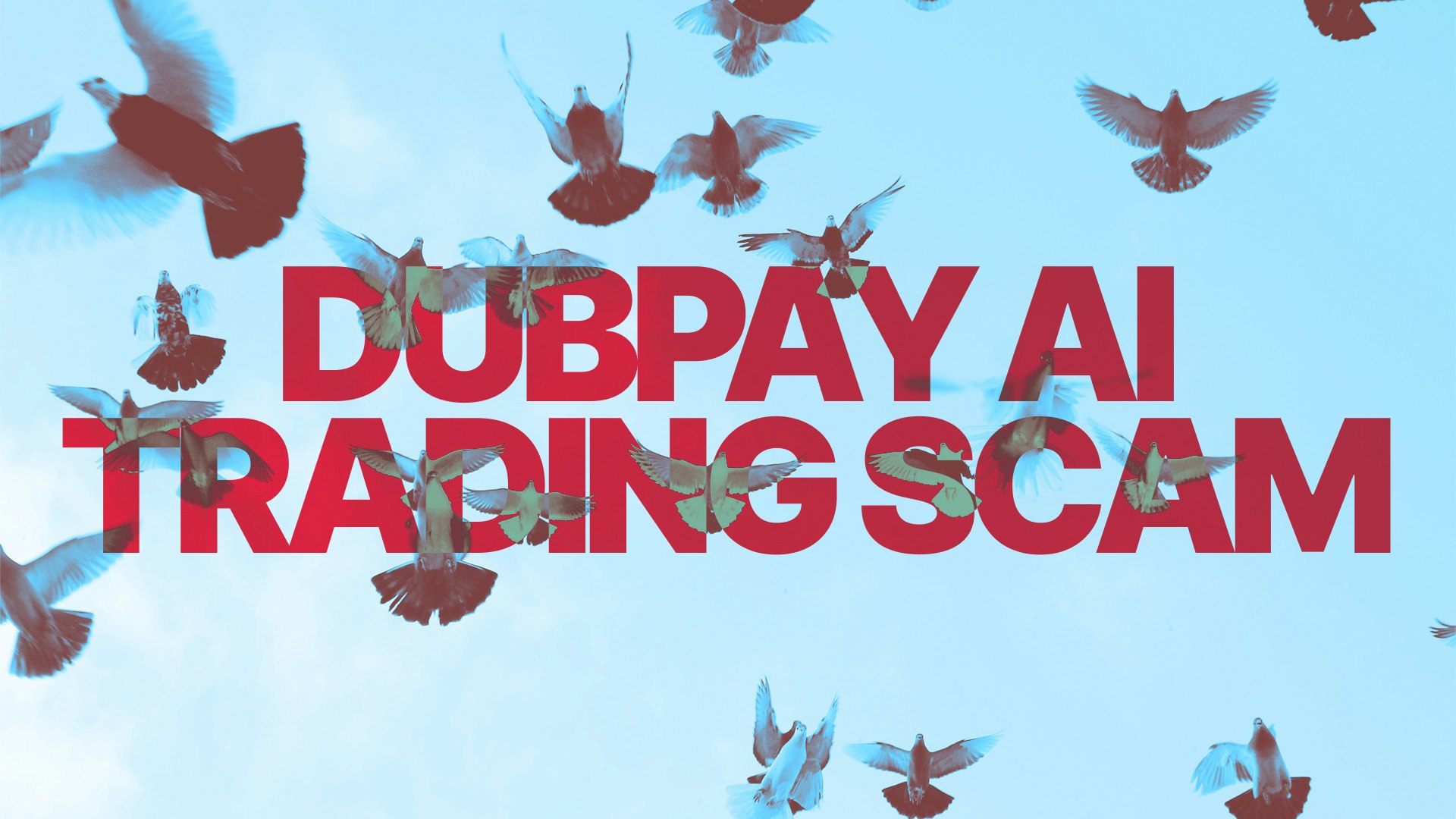
What is the DubPay AI Trading scam? Scammers are constantly refining their tactics, and one of the latest involves the use of fake news articles to convince people that national governments are backing cryptocurrency schemes.
The scam we’re breaking down today revolves around the fraudulent promotion of a cryptocurrency known as DubPay, supposedly endorsed by Dubai’s government. Let’s analyse the elements of this scam and identify the red flags that expose its deceit.
1. The Facebook ad: Exploiting political imagery
The scam begins with a sponsored Facebook ad. The ad uses an image of a political figure in Dubai, alongside a backdrop of financial graphs. It claims to show a momentous event where a country has “taken a stand against banks” and promises to give back to the people. The ad links to a suspicious website, which immediately raises concerns.
Red flags
Unauthorised use of a political figure: The ad misappropriates the image of a political figure to make the scam seem credible. Government officials, especially from countries like Dubai, do not publicly endorse specific financial schemes like this.
Vague and sensational claims: Phrases such as “the biggest event in history” and “a country has taken a stand against banks” are overly dramatic and designed to provoke an emotional reaction from the reader, making them more likely to click.
Suspicious website: Clicking the link directs users to a shady URL that doesn’t match any known legitimate platform or government entity.

2. The fake news article: Government-backed cryptocurrency
Once users click through the ad, they are redirected to a fabricated news article . The article, attributed to Forbes and written by a fake journalist, Vicky Valet, claims that Dubai has officially adopted a cryptocurrency called EmCash as their national coin.
It even includes supposed quotes from Dubai’s deputy finance minister, Sheikh Maktoum bin Mohammed, stating that the coin can only be purchased from DubPay Group.
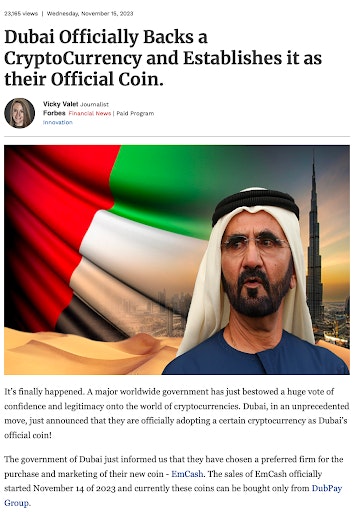
Red flags
Fabricated legitimacy: Scammers frequently cite respected publications (in this case, Forbes) and create fake journalist profiles to lend credibility to their claims. However, legitimate news sources never run “paid programs” disguised as actual news, especially ones promoting cryptocurrencies.
Government endorsement of a cryptocurrency: While some countries are exploring digital currencies, governments do not endorse or exclusively distribute privately-run cryptocurrencies through obscure companies like “DubPay Group.”
Sensational pricing claims: The article suggests that EmCash is available for purchase at just $0.0014 per coin, significantly cheaper than Bitcoin or Ethereum. The extremely low entry price is intended to make potential investors feel like they’re getting in on the ground floor of a massive opportunity, but this is classic scam behaviour.
3. The DubPay Platform: False promises of huge profits
The final step of the scam directs users to a DubPay webpage, which touts itself as a way to convert AUD into Dubai’s new “official government-backed cryptocurrency.”
It promises users that for every AUD they invest, they can expect potential profits of 5100 AUD within three months. The page features typical scam elements, such as luxury images (yachts and expensive cars) and a fake video player button designed to make the site look more professional.
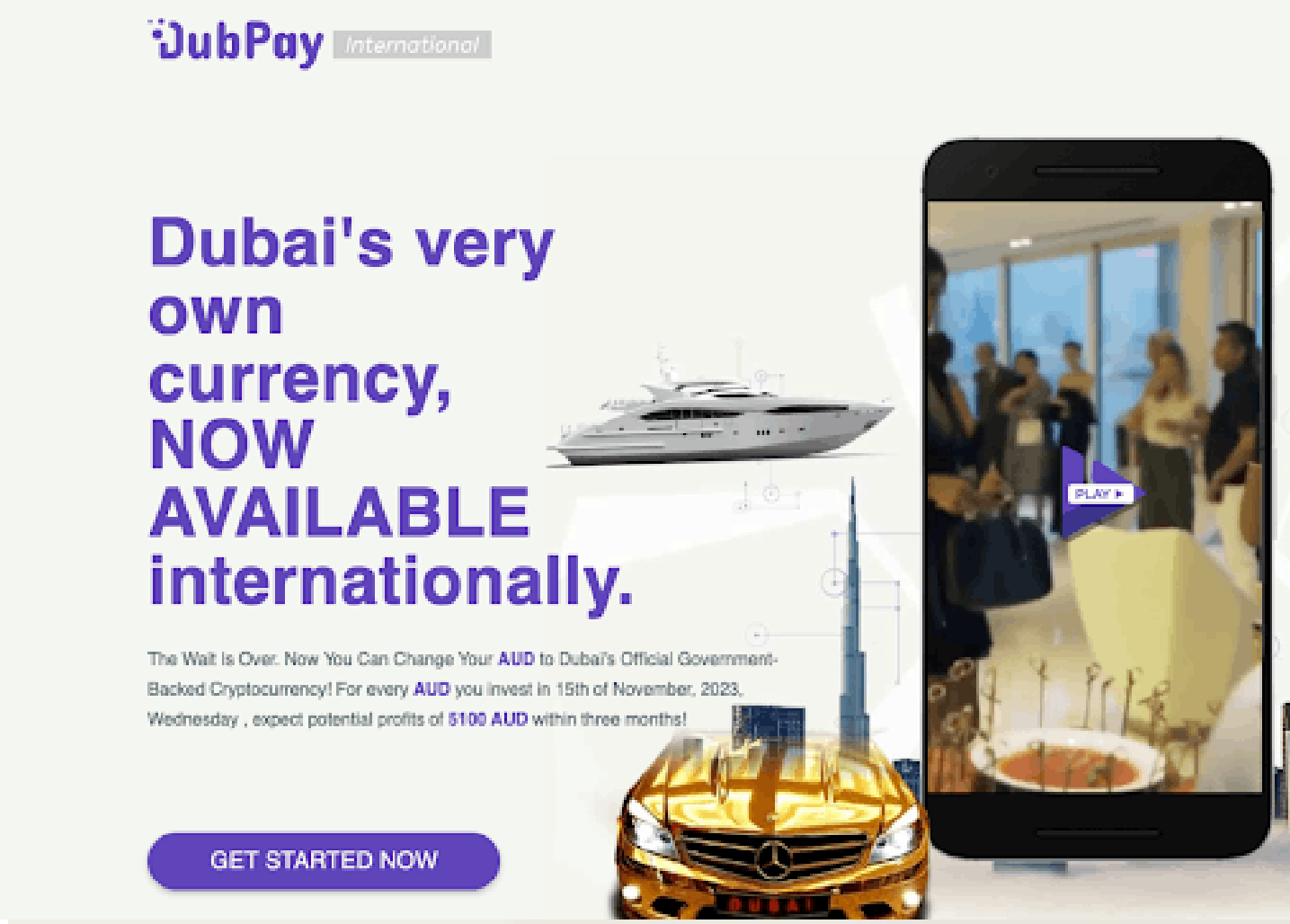
Red flags
Unrealistic profit promises: The promise of turning a small investment into thousands of dollars in just three months is an unrealistic claim and a hallmark of scams.
No legitimate investment can guarantee such returns in such a short time.
Luxury imagery: Scammers often use images of high-end products (like yachts, luxury cars, and cityscapes) to make their scheme seem more enticing. These images are designed to create an association between wealth and the product being promoted, tricking victims into believing they can achieve similar success.
Suspicious URL: The website is another red flag. Legitimate platforms for government-backed cryptocurrencies would not use random domains but would instead have official government URLs.
Conclusion: Protecting Yourself from Scams
This DubPay scam follows a familiar formula, using false endorsements, fake news articles, and exaggerated profit promises to trick users into handing over their money. Here are a few tips to protect yourself from similar schemes.
Verify government endorsements: Governments do not use paid ads to promote national currencies or cryptocurrencies. Always verify claims through official government websites.
Research the platform: A simple search for reviews or the legitimacy of a website can often reveal if it’s part of a scam. Always avoid investing in schemes that promise unusually high returns in a short period.
Check URLs: Legitimate websites should have secure, easily recognizable URLs. Be wary of obscure domain names or websites without a secure connection.
By staying alert to these red flags, you can avoid falling victim to scams like DubPay and protect your financial security. Always be cautious when something seems too good to be true — it probably is. Stay informed and stay safe!
About the author - Lukas Jackson
Lukas Jackson is a leading expert in compliance with over 5 years of experience in crypto, AML/CTF regulations and scams prevention. Actively involved in initiatives focused on scam prevention and public education, Lukas has a passion for protecting individuals from online threats.
With a focus on raising awareness and developing strategies to combat scams, Lukas is committed to driving efforts that help people recognise and avoid scams.


Suggested Articles
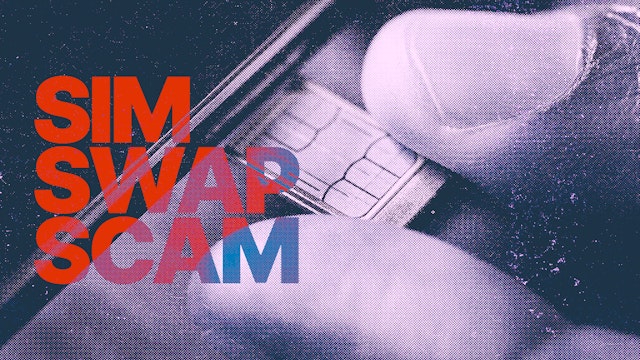
The SIM-Swap Crypto Scam Out to Take Your Bitcoin
A SIM-Swap crypto scam aims to steal your crypto. Here's how to protect yourself against this "phone porting" danger. Read more
Crypto ATMs: How to Protect Yourself from a Growing Scam Risk
The number of victims of crypto ATM scams are on the rise. Here's what to look out for. Read more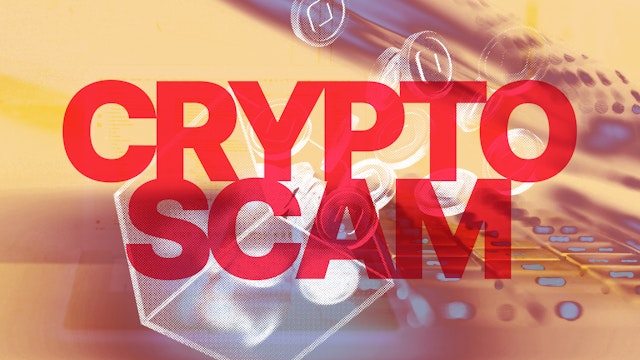
Christmas Scams: Tips to Stay Safe During the Holiday Season
New scams are on the loose. Here's one to be careful of at Christmas time. Read moreBrowse by topic
The above article is not to be read as investment, legal or tax advice and takes no account of particular personal or market circumstances; all readers should seek independent investment, legal and tax advice before investing in cryptocurrencies.
This article is provided for general information and educational purposes only. No responsibility or liability is accepted for any errors of fact or omission expressed therein. CoinJar, Inc. makes no representation or warranty of any kind, express or implied, regarding the accuracy, validity, reliability, availability, or completeness of any such information.
Past performance is not a reliable indicator of future results.
Your information is handled in accordance with CoinJar’s Privacy Policy.
Copyright © 2025 CoinJar, Inc. All rights reserved.
CoinJar, Inc. is a registered Money Services Business with FinCEN and licensed as a money transmitter, NMLS #2492913. For a list of states in which CoinJar, Inc. is licensed or authorized to operate, please visit here. In certain other states, money transmission services are provided by Cross River Bank, Member FDIC.
This site is protected by reCAPTCHA and the Google Privacy Policy and Terms of Service apply.

